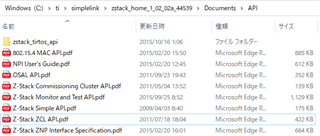Part Number: CC2650EMK
Other Parts Discussed in Thread: CC2538, CC2650, Z-STACK
Hi,
I've Zigbee end devices ( CC2650) developed based on Z Stack 1.2.2HA which communicate with coordinator CC2538 .
I know ZED send BeaconRequest packet using NLME_NetworkDiscoveryRequest.
But I dont know return value and when that code output error code.
What are the specifications for NLME_NetworkDiscoveryRequest?
1. Arguments of functions (especially scanDuration)
2. Error code
3. Conditions under which the error code occurs.
Please let us know if there is any documentation on these.
Best Regards,
Yuya Murata


